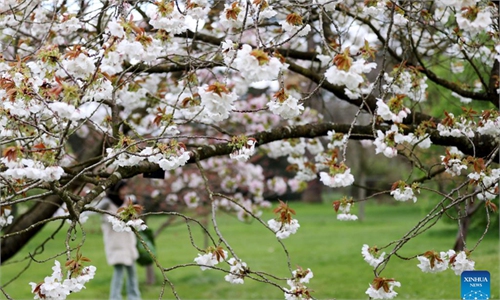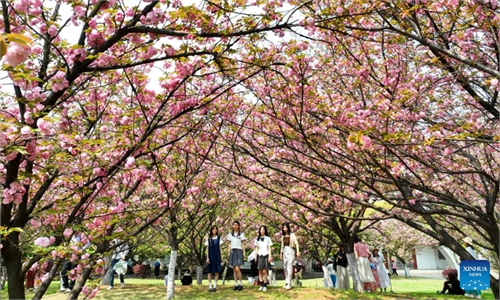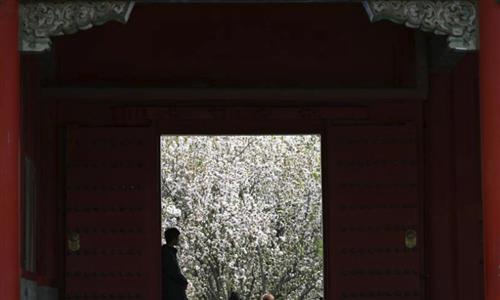ARTS / CULTURE & LEISURE
A floral journey in Kunming
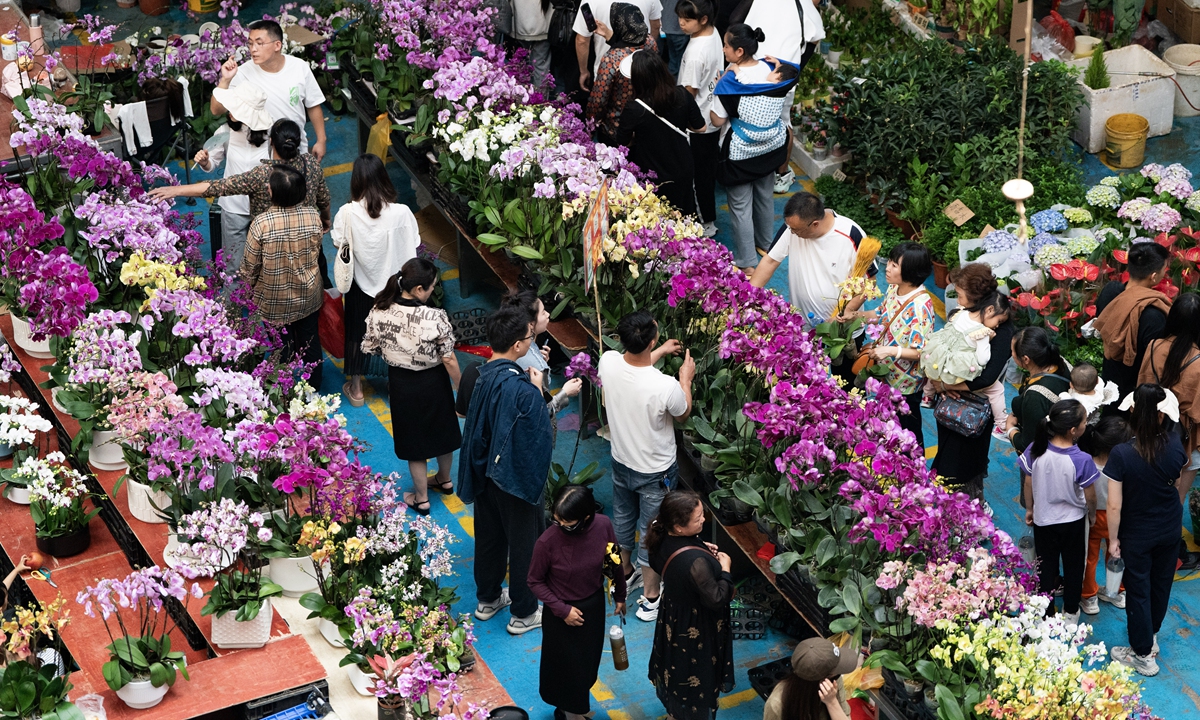
Tourists purchase flowers at the Dounan flower market in Kunming, Yunnan Province. Photo: Xinhua
In March, the rich spring atmosphere is highlighted by the blossoming of flowers in Kunming, Southwest China's Yunnan Province. On China's social media platforms, "flower appreciation check-in" has become a popular tag for travelers to Kunming.Many netizens claimed, "The flowers in Kunming will not disappoint any romantic person," and "come to Kunming to experience the floral freedom."
In recent years, the fresh cut flower industry in Yunnan has continued to grow steadily. The annual production of fresh cut flowers now exceeds 18 billion stems, and the output value of flowers has surpassed 100 billion yuan ($14 billion). Flower planting bases and trading venues such as the Dounan flower market in Kunming and the Bajie edible rose base in Anning have also become popular destinations, attracting crowds of tourists.
Appreciating, picking and buying flowers among other ways of enjoying flowers have emerged in the flower industry. "Bringing spring home" has become a new experience for trips to Yunnan, and "flowers + tourism" has become a new highlight of Yunnan's cultural tourism.
Bustling flower market
Exiting from Kunming metro's Jingui Street Station, you will immediately enter the Dounan flower market.
"What variety is this?" "How much is it for this bouquet?" "How long can they last?" Inside the flower market, stalls of all sizes are filled with various fresh flowers, and the voices of tourists inquiring and buying reverberate across the hall.
When the reporter arrived at the stall of vendor Cai Jianhua, he had just sold two bouquets of blue wind chimes and was busy arranging new flowers and setting price tags. Cai said, "During the International Women's Day, we have many customers. Our flower market is even busier than the bustling streets during holidays such as summer and winter vacations, and Chinese New Year. It's hectic."
Cai has been selling flowers at the Dounan market for over 20 years, serving tourists from all over China and even foreign tourists who come with translators. "In recent years, there have been more and more domestic and foreign tourists coming to buy flowers," Cai said. He proudly mentioned that his WeChat contact list includes about 2,000 customers from different regions. "They all love flowers and many of them are repeat customers," Cai noted.
In Dounan, fresh flowers rightfully take the spotlight. The vast majority of tourists who come to Dounan are for the flowers such as roses, lilies, sunflowers, chrysanthemums, hydrangeas among others. As the largest fresh cut flower trading center in Asia and the second largest in the world by trading volume, Dounan market offers 117 categories and over 1,600 varieties of fresh flowers. Faced with a dazzling array of colors, unique varieties, and favorable prices, a customer surnamed Xu from Hangzhou, East China's Zhejiang Province said that she was already dazzled by the "kaleidoscope of flowers."
"The flower market is very impressive, and the flowers are so appealing, I want to take them all home," said Xu with a fresh flower wreath on her head. Xu usually set Kunming as a transit station during her trips to Yunnan. However, this time she decided to make Dounan the last stop of her journey, and she didn't expect to experience such happiness in the "world of flowers." Xu decided to bring back home the spring colors of Yunnan, which are hydrangeas, roses, lilies, and other flowers.
In addition to flowers, the bustling trading scene is also a unique landscape of the Dounan market. At 8 pm when the night market opens, flower vendors and brokers begin bulk purchases, and groups such as e-commerce anchors and bloggers come to life.
"From dusk onwards, you can often see people live streaming with their phones on the streets outside the flower market," said Qian Chongjun, executive president of Yunnan Dounan Flower Industry Group.
Leveraging the vibrant night market trading scene, in July 2022, Dounan flower market was listed as the second batch of national-level nighttime cultural and tourism consumption areas. In 2023, Dounan Flower Industry Park received over four million visitors, with tourism revenue exceeding 200 million yuan. As the operator of Dounan flower market, Dounan group is committed to optimizing services to ensure that visitors have a safe and comfortable experience.
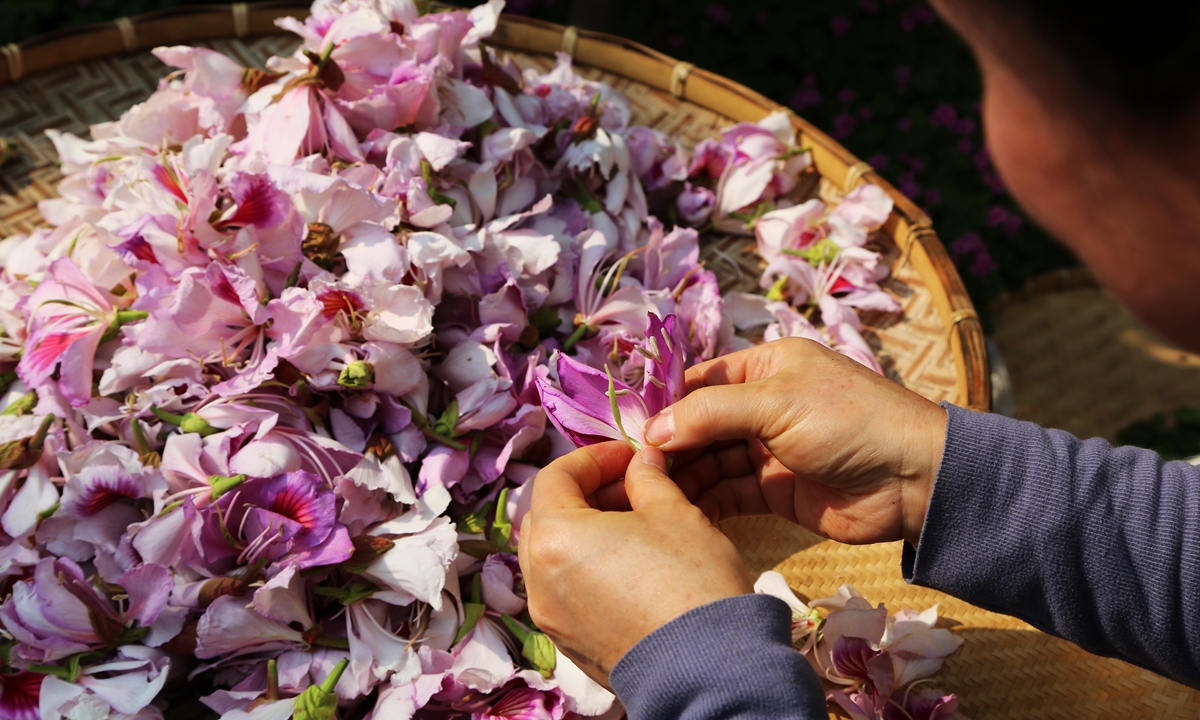
A flower farmer sorts out lotus flowers in Honghe Hani and Yi Autonomous Prefecture, Yunnan Province. Photo: Xinhua
Building the brandSince the first commercially sold Sword Lily was planted in Dounan village in 1983, the flower industry in Yunnan has been steadily growing for over 40 years, with continuous improvement in the modern flower industry system. Today, out of every 10 fresh cut flowers produced nationwide, seven stems come from Yunnan. As the flower industry moves towards high-quality development, the flower tourism industry, which covers flower market consumption and floral culture, is also booming. In recent years, Yunnan has been strengthening the "Yunhua" brand, building a complete flower industry chain, and continuously promoting the integrated development of "flowers + tourism."
In the first half of 2023, Kunming metro's Jingui Street Station became popular online. Walking in the subway station, there were various flower murals and huge flower decorations on the walls. Almost every passenger held a bouquet of flowers, creating a romantic atmosphere everywhere you looked.
"In order to enrich the tourist experience, we collaborated with the subway station to highlight floral elements in visual design and enhance the brand of Dounan flower market," said Guo Zhaochuan, head of the Dounan flower industry service center. Experiential floral tourism has become the choice of more tourists.
In 2023, the service center utilized vacant land around the flower market to plant tulips, daisies, pansies, and other flowers, creating two small parks. These parks provide broader leisure spaces for local residents and tourists who visit the flower market.
Walking out of the Exit B of the Jingui Street Station, the traffic, with its two-way three-lane road, flows smoothly. "In the past two years, this area used to be frequently congested, especially during holidays when logistics trucks and tourist buses found it extremely difficult to move an inch," Guo said.
In 2023, to improve the accessibility of the transportation network near the flower market, the People's Government of Chenggong District in Kunming adopted measures such as upgrading surrounding roads and widening Jingui Street to alleviate congestion. This not only facilitates the transportation of flowers but also enhances the travel experience for tourists.
Where there's a holiday, there are flowers. "On romantic occasions for expressing love, besides gifting flowers, many people choose to go on a romantic date together," Guo said.
On May 20, 2023, Dounan flower market auctioned over 9 million fresh flowers, and 1,500 drones formed various shapes such as roses in the night sky, attracting a large number of citizens and tourists to come and enjoy the festive romantic atmosphere.
"That day, the number of visitors reached up to 140,000," Guo said. He added that on occasions such as International Women's Day, Mother's Day, Valentine's Day, and 5·20-China's Valentine's Day, Dounan market organizes special cultural and tourism activities and exhibitions to attract tourists, continuously enhancing the Dounan brand and promoting the cultural tourism industry to blossom like a flower.
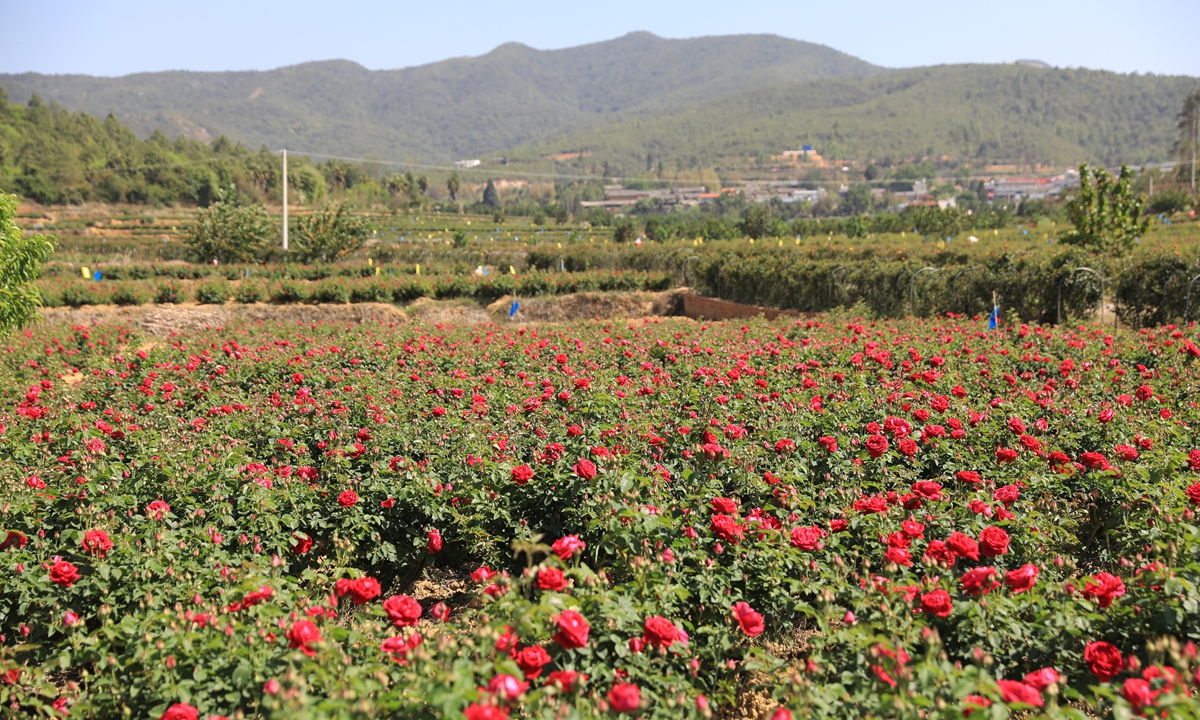
The edible rose field in Bajie subdistrict of Anning, Yunnan Province Photo: Courtesy of the publicity department of the CPC Anning municipal committee
Edible rosesIn Yunnan, where it feels like spring all year round, apart from the refreshing fragrance of flowers and grasses carried by the gentle warm breeze, another important flavor of spring comes from edible flowers.
According to a research conducted by the Kunming Institute of Botany, Chinese Academy of Sciences, there are over 300 species of edible flowers in Yunnan, such as the yellow-green calendula, the pink and tender lotus flower, the large white azalea loved by the Bai ethnic group, etc. "Eating flowers in spring" is a special traditional custom among the people of Yunnan. Among the many edible flowers, the most widely accepted and popular is undoubtedly the edible rose.
In the Xianglian village of Bajie Street in the city of Anning, villager Jiang Zhenghong inspected the growth of rose branches in his own over 10-mu (0.67-hectare) edible rose field. "Some branches have already sprouted flower buds, and with the current temperature, they will start blooming gradually around early April," Jiang said.
The edible roses planted in contiguous fields in the village attract a large number of tourists to admire and pick during the flowering season. In the past two years, the village has set up ovens next to the flower fields. After picking roses, tourists can make fresh flower cakes on the spot, enjoying everything spring has to offer, Jiang noted.
According to Li Zhenghai, the Party secretary of the Xianglian village, the type of rose planted in the village is the Dianhong double-petal edible rose, which covers an area of approximately 1,400 mus. Mid-April every year is the peak flowering period for edible roses. The roses blooming during this time are called "first flush roses." They have a strong fragrance and are most suitable for making fresh flower products.
There are nine specialized rose cooperatives in the village. After farmers plant and harvest the roses, they can deliver them to five companies in the village for initial processing into products such as fresh flower cakes and rose flower sauce.
Standing on the observation deck of the rose valley in the village, Li recalled, "Ten years ago, nobody could have imagined that the roses scattered across the mountains could bring prosperity to our village."
As early as 2013, the village hosted its first rose festival, which significantly increased the popularity of the rose valley. Over time, more tourists visited the rose valley, exposing shortcomings in rural tourism infrastructure. "We not only need to solve problems like parking, dining, and accommodation but also strive to provide tourists with rich sightseeing experiences," Li said.
Since 2019, the village has built and improved facilities such as parking lots, public toilets, and observation decks. It has also collaborated with private companies to create new tourism projects, enriching the experience of "flower appreciation tours" with fresh flower cakes that are picked, baked, and eaten on the spot.
Nowadays, tourists visiting the village not only have the opportunity to experience the daily lives of local flower farmers but also purchase souvenirs such as fresh flower cakes, rose candies, and handmade flower soaps, bringing the taste of spring back home to share with family and friends.
"With more tourists, our local specialties sell better. My wife and I sell some free-range eggs and handcrafted flower wreaths. We can earn tens of thousands of yuan in just over 10 days," Jiang Zhenghong said.
Amid the vibrant development of the flower industry in Yunnan, the integration of "flowers + tourism" continues to flourish. Whether it's appreciating, buying, picking, or savoring the flowers, the charm of flowers not only allows more people to experience the allure of Yunnan's cultural tourism but also continuously translates into productivity, bringing one hopeful spring after another for flower industry practitioners.
